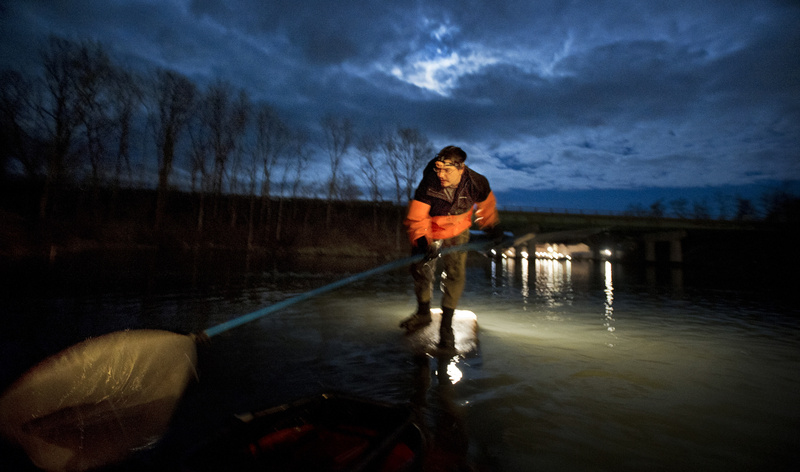PORTLAND — With baby eels becoming a lucrative catch, more people will be going after elvers in Maine rivers, but the amount of fishing nets will remain the same under proposed new regulations that establishes a lottery system for new elver fishing licenses.
The Department of Marine Resources published proposed rules this week based on a new law passed last spring. The rules would allow new entrants into the elver fishery for the first time since 2006, when a freeze on new licenses was instituted.
A license would become available when a current license holder drops out of the fishery. One new license would be issued for every net that’s retired; if a fisherman now licensed to fish two nets drops out, two new fishing licenses would be issued for one net each. The lottery would be held by Feb. 15 each year.
The number of licenses has dropped from 653 to 407 since the state stopped issuing new licenses six years ago. And those in the elver industry say it is important to allow new people into the fishery to ensure a sustainable industry.
But regulators also are aware that fishing pressures shouldn’t be increased at a time when the U.S. Fish & Wildlife Service is reviewing whether to list the American eel as threatened or endangered, said Deirdre Gilbert, director of state marine policy for the Department of Marine Resources.
“From the Legislature’s point of view, the goal is not to increase the amount of gear in the water given the unknowns around the fishery at this time,” she said.
Only Maine and South Carolina allow elver fishing. While hundreds of Maine fishermen fish scores of rivers, South Carolina handed out only 10 permits this year and allowed fishing on only one river. Officials estimate this year’s catch in Maine could be worth $40 million to $50 million, making it the state’s second most-valuable fishery, behind lobsters.
Prices skyrocketed last spring to more than $2,000 a pound, with the catch mostly shipped to Asia, where they are raised in farm ponds to market size and then sold to retailers and restaurants.
Since the 1970s, Maine fishermen have been going after elvers, which make their way up Maine rivers each spring. But the fishery didn’t draw much attention until the 1990s when prices rose to more than $200 a pound, creating a gold rush of sorts.
Randy Bushey, an elver fisherman and dealer in Steuben, said new licenses will keep the industry viable.
“Every year people drop out, and when we drop down to around 400 we need to open the lottery back up and get it back up to a reasonable sustainable number,” Bushey said.
He said the state should also address whether to place a cap on the number of elver dealer licenses, given the increased interest in the elver market. Gilbert said about two dozen dealer licenses were issued last year — double the usual number.
Fishing interests also are watching activity among the Passamaquoddy Tribe, which surprised fishery officials last spring by issuing 236 elver licenses to tribal members. By law, the tribe has the authority to issue licenses, but license-holders must follow state laws and regulations.
“It’s my expectation it will be a topic of discussion (during the upcoming) legislative session,” Gilbert said.
Send questions/comments to the editors.



